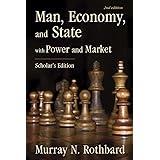
Download the free Kindle app and start reading Kindle books instantly on your smartphone, tablet, or computer - no Kindle device required.
Read instantly on your browser with Kindle for Web.
Using your mobile phone camera - scan the code below and download the Kindle app.

OK
Power and Market: Government and the Economy Paperback – January 1, 1977
- Print length304 pages
- LanguageEnglish
- PublisherSheed Andrews and McMeel
- Publication dateJanuary 1, 1977
- ISBN-100836207513
- ISBN-13978-0836207514
The Amazon Book Review
Book recommendations, author interviews, editors' picks, and more. Read it now
Customers who viewed this item also viewed
Product details
- Publisher : Sheed Andrews and McMeel; 2nd edition (January 1, 1977)
- Language : English
- Paperback : 304 pages
- ISBN-10 : 0836207513
- ISBN-13 : 978-0836207514
- Item Weight : 13.6 ounces
- Best Sellers Rank: #3,671,666 in Books (See Top 100 in Books)
- #2,793 in Development & Growth Economics (Books)
- Customer Reviews:
About the author

Murray Newton Rothbard (/ˈmʌri ˈrɑːθbɑːrd/; March 2, 1926 – January 7, 1995) was an American heterodox economist of the Austrian School, a revisionist historian, and a political theorist(pp11, 286, 380) whose writings and personal influence played a seminal role in the development of modern libertarianism. Rothbard was the founder and leading theoretician of anarcho-capitalism, a staunch advocate of historical revisionism, and a central figure in the twentieth-century American libertarian movement. He wrote over twenty books on political theory, revisionist history, economics, and other subjects. Rothbard asserted that all services provided by the "monopoly system of the corporate state" could be provided more efficiently by the private sector and wrote that the state is "the organization of robbery systematized and writ large." He called fractional reserve banking a form of fraud and opposed central banking. He categorically opposed all military, political, and economic interventionism in the affairs of other nations.(pp4–5, 129) According to his protégé Hans-Hermann Hoppe, "There would be no anarcho-capitalist movement to speak of without Rothbard."
Rothbard was a heterodox economist. Economist Jeff Herbener, who calls Rothbard his friend and "intellectual mentor", wrote that Rothbard received "only ostracism" from mainstream academia. Rothbard rejected mainstream economic methodologies and instead embraced the praxeology of his most important intellectual precursor, Ludwig von Mises. To promote his economic and political ideas, Rothbard joined Llewellyn H. "Lew" Rockwell, Jr. and Burton Blumert in 1982 to establish the Ludwig von Mises Institute in Alabama.
Bio from Wikipedia, the free encyclopedia. Photo by Ludwig von Mises Institute [CC BY 3.0 (http://creativecommons.org/licenses/by/3.0)], via Wikimedia Commons.
Customer reviews
Customer Reviews, including Product Star Ratings help customers to learn more about the product and decide whether it is the right product for them.
To calculate the overall star rating and percentage breakdown by star, we don’t use a simple average. Instead, our system considers things like how recent a review is and if the reviewer bought the item on Amazon. It also analyzed reviews to verify trustworthiness.
Learn more how customers reviews work on Amazon-
Top reviews
Top reviews from the United States
There was a problem filtering reviews right now. Please try again later.
Many people say the US has a free-market economy; anyone who says so is either a fool or a knave. If you don't already fully understand what I'm telling you, read this book.
Unlike most Austrian school economists, Rothbard was an anarchist. In fact, he was the twentieth century's seminal figure in anarcho-capitalist thought. This means that Rothbard thought that not only roads and the like, but also national defense and courts could be provided without a state. (See his Society Without a State in the Libertarian Reader, ed. Machan, for a succinct presentation of his views.)
Rothbard starts out this work with a discussion of various types of government intervention in the economy. He divides them into three types: autistic (violent crime), triangular (tariffs, wage and price controls, licensing, etc.)and binary intervention (taxation and government spending). Following this is a discussion of antimarket ethics. There isn't an aspect of government intervention in the economy that escapes Rothbard's scalpel. As a whole, this is certainly an outstanding book. Take Rothbard's discussion of taxation. Many "right wing" economists support the sales tax on the ground that it doesn't discourage savings and investment. But it reduces people's income and thereby reduces savings and investment. It is a tax on income. [pp. 92-93.]
My main problem with this work is the sometimes simplistic discussion of complex problems and the leaps in logic. (I've discussed this is my review of The Ethics of Liberty.) Take for example the issue of immigration laws. "The advocate of immigration laws . . . really fears, therefore, is not so much immigration as any population growth. To be consistent, therefore, he would have to advocate compulsory birth control, to slow down the rate of population growth desired by individual parents." [p. 55.] Even in light of the entire 2 page discussion of immigration laws, I don't see how this follows. In this (and some other areas) the discussion is narrowly economic. Aren't there good reasons to restrict the type of immigrants? For example, if you have a society that is devoted to individual freedom and responsibility, isn't it wise to prevent immigration from those countries that don't support freedom?
If you want to know the essence of Rothbard, purchase this work; Man, Economy, and State; The Ethics of Liberty; and the Logic of Action.





